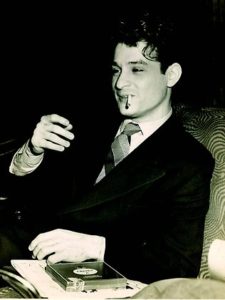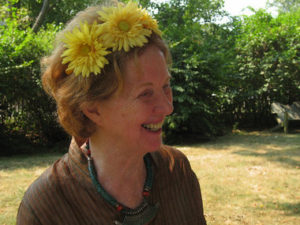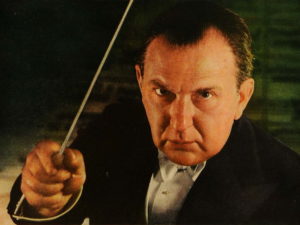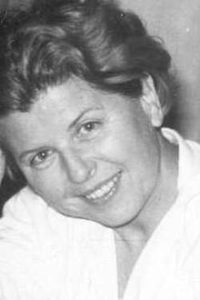As a great deal of unknown recordings keep emerging by William Kapell,

one work risks being presented out of context and without the objections it aroused in the pianist’s wife Dr. Anna Lou DeHavenon.

DeHavenon had studied piano with Tarnowsky, Vladimir Horowitz’s teacher. Once we attended a concert of Indian ragas performed by the singer Pandit Jasraj and sitar-surbaharist Imrat Khan. Never in my life had I seen someone listen so intently, deeply immersing herself into every tone. I asked her afterwards if she ever had advised Kapell and she demurred, saying that she would mention details. They first met when she came backstage to congratulate him after a performance of Rachmaninoff’s Second Piano Concerto and made a few observations about his playing that turned him inside-out, struck by her acute perception and beauty. A good idea of her musical insight can be gleaned from an interview with her in 1995:
Once you knew DeHavenon, you could never have enough time with her and luckily an interview about her work as an urban anthropologist may be seen:
Soon after their marriage, Kapell was ordered by the martinet conductor Fritz Reiner

to prepare Richard Strauss’ Burlesque for piano and orchestra. Not knowing the work and confident that his own choice of concerto would be accepted as a replacement, he ignored the request until receiving a phone call from Reiner, confirming their 1947 date with the Pittsburgh Symphony a week later. Realizing that Reiner meant business and there was no way out of playing the work, Kapell spent a traumatic week forcing himself to learn a work that was not in sync with his aims. After a Russian-heavy focus imposed on him by his teacher Olga Samaroff, Kapell sought to spend more time with Bach, Beethoven, Schubert, and others. Reiner knew the composer and often performed his works, making him a good ally for the piece but having to play it without the laborious preparations he usually devoted to all details in every work he programmed, the stress made it into a career nightmare.
Dr DeHavenon witnessed and tried to manage her husband’s anguish during a week of musical misery. The performance was recorded onto two discs: one was donated by the family along with his archive to IPAM (Interational Piano Archive, University of Maryland), but only half the performance seemed to have survived. One day while searching her Kapell papers, DeHavenon phoned to say that the missing disc had turned up and I was welcome to it. Eager to hear this one-time experience, warts and all, IPAM loaned their second disc and luckily it coincided at a time when Arbiter’s Sonic Depth Technology had been developed to rescue and liberate the sounds embedded within mediocre privately pressed broadcast discs. As this restoration is exclusive to us, we think best to offer the entire performance in this format, as most engineers favor a quiet vinyl-like playback that evirates the sound’s fullness.
When playing in the best of circumstances, with a simpatico collaborator like Maria Stader,

Kapell breathes his musical grandeur. He and Stader offered six Schubert songs at the 1953 Prades Festival organized by Pablo Casals. This blossoming of his art makes it all the more tragic as belonging to his last year, one in which he planned more absorption with the classics and his concern to pioneer new music. We hear them in Schubert’s Im Frühling D.882 (In Spring), taken from the spring of Kapell’s life.
©Allan Evans 2016

Flabbergasting !..can’t think of a better, more appropriate time to use that word! Thank you, Mr. Evans..
The Strauss is remarkable , perhaps the most distinctive I’ve ever heard , so transparent and spirited and nimble , where most are turgid. And live ?!! And after Kapell learning the work just the week before ?!! Mon Dieu,what a loss.
Thank you Alan!!
Dear Allan, No less remarkable a remarkable achievement is another William Kapell reminiscence related to me in London by the great cellist, Edmund Kurtz, in which he told me that he and Kapell were to record together in London, the Rachmaninoff Cello Sonata for RCA Victor. Due to a very heavy performance schedule prior to the recording, Kapell had literally no time to learn the work. Upon his arrival in London, he went to Kurtz’s home and set out to work non-stop on the difficult piano part all day and through the night literally learning the work overnight — an almost impossible feat, being that the Cello Sonata is one of Rachmaninoff’s most technically challenging works for the piano. I was told this story in the late 1970’s when I had come to Mr. Kurtz’s home to play the Rachmaninoff Cello Sonata for him with a Swiss cellist, Francois Guineux. Imagine my surprise and joy to learn that the Steinway piano I was playing on in Mr. Kurtz’s living room was not only the same piano that Kapell had used to prepare the Rachmaninoff Cello Sonata and rehearse it with Kurtz, but was also the same piano that Rachmaninoff, the composer, himself had used, also in collaboration with Kurtz. I didn’t want to wash my hands for a week, after learning that both Rachmaninoff and Kapell, had touched Kurtz’s Steinway piano. The RCA recording of the Rachmaninoff Cello Sonata with Kapell and Kurtz is now considered by many around the world to be an immortal legendary performance on disc – and considering the above story as related to me by the great cellist, Kurtz – what Kapell achieved is a pianistic feat, that could only be called, simply colossal.
Thank you, dear Allan for sharing these remarkable performances of William Kapell in Strauss’s “Burleske” in his collaboration with Fritz Reiner and the Pittsburgh Symphony, and the equally wonderful collaboration with singer Maria Stader in that poignantly beautiful Schubert song “Im Fruhling”. What a wonderful gift to know that these precious recordings exist.
What a surprise to have this account of Kapell’s love and labors on behalf of Rachmaninoff, a composer he adored. He and his wife heard him in recital (separately).
He basically did the same feat recording the Brahms 3rd sonata with Heifetz!
Just discovered this site via Norman Lebrecht’s Slipped Disc. This is wonderful thank you.
This perhaps the recording that brought Kapell to fame – Khachaturian Piano Concerto with Koussevitsky and the Boston Symphony:
https://www.youtube.com/watch?v=9IxJbwoq4ec
I was fifteen years old when Kapell died. I had heard him with the Atlanta Symphony Orchestra in the Rachmaninoff Rhapsody, but I was too young to retain a memory of the performance. My sister was in the cello section and often told me of his intensity and mastery when I later fell in love with his recording of the piece, with Reiner. I was brought up with a piano and 78 rpm record player as the family entertainment. But it was not until I heard Kapell’s recordings that I truly fell in love with music. His fire and his musical and technical brilliance simply overwhelmed. I’ve heard many, many great–and not so great–pianists, both in person and recorded since those days, but I’ve never heard Kapell’s peer. Thank you so much, Alan, for these recordings. The Burleske has the same incendiary passion that I have always heard in Kapell’s playing. For all the sonic brittleness, it’s the finest performance of the piece I’ve heard. And to think that he learned it in a week! I suppose we have to be grateful to Reiner, after all.